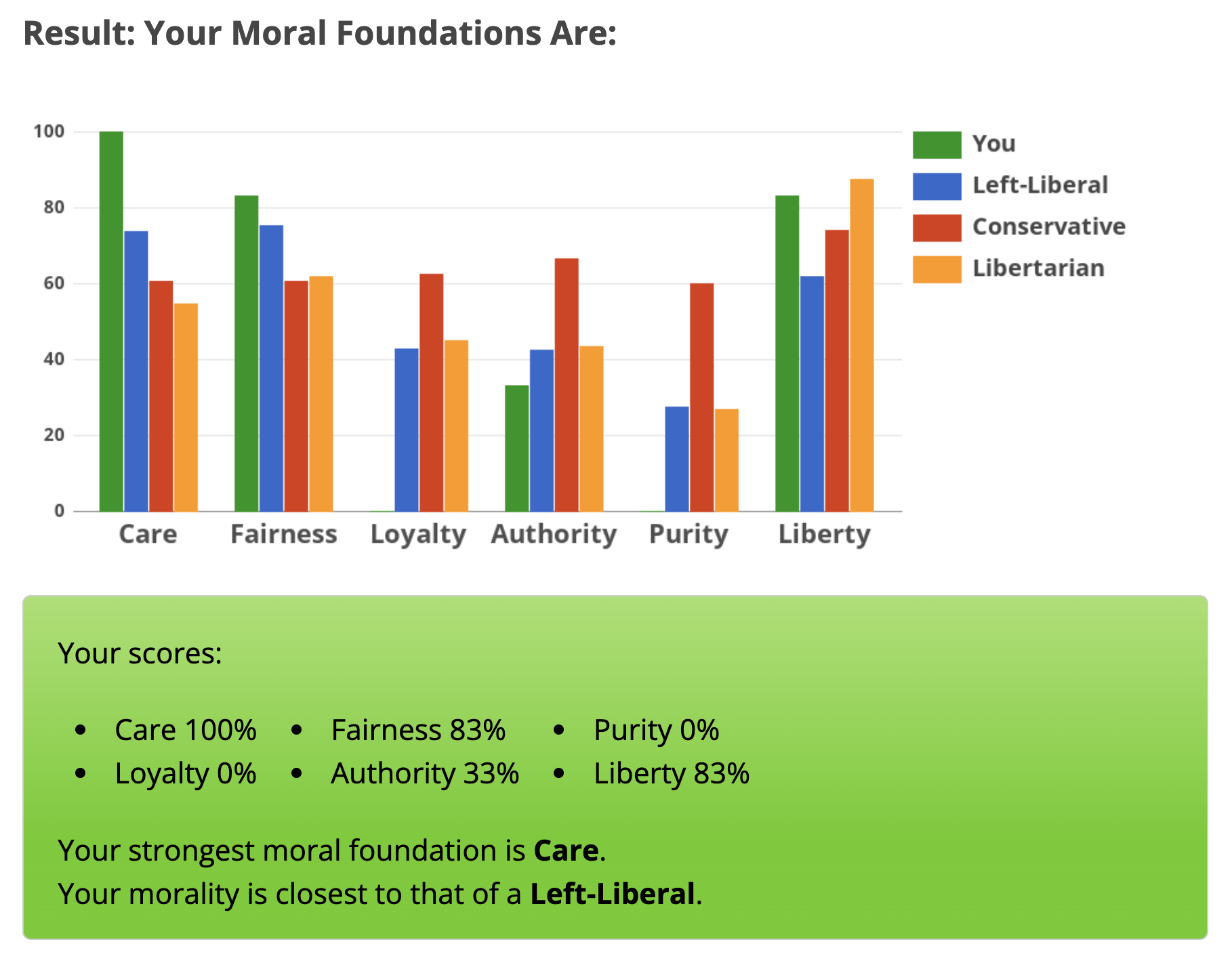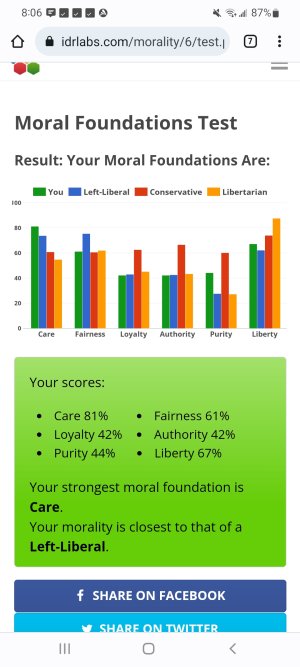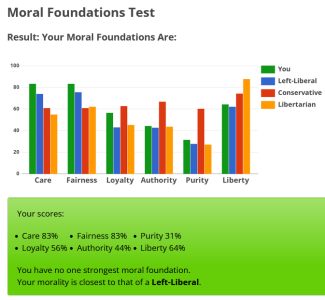- MBTI
- ENFP
- Enneagram
- 947 sx/sp
Moral Foundations Test – IDR Labs
immediate results, no email required
Social scientists such as Ravi Iyer and Jonathan Haidt argue that there are substantial variations in human morality and that these differences influence not just a person's decision making and reasoning processes but also their political outlook. In recent years, researchers and scholars from all over the world have converged on the framework on Moral Foundations Theory in an attempt to explain these individual differences, as well as to make sense of the many instances of moral outrage and offense that are increasingly seen in public debate. By drawing on findings from their research, this test aims to give you your scores according to the Moral Foundations framework.
-------
Cheers,
Ian
immediate results, no email required
Social scientists such as Ravi Iyer and Jonathan Haidt argue that there are substantial variations in human morality and that these differences influence not just a person's decision making and reasoning processes but also their political outlook. In recent years, researchers and scholars from all over the world have converged on the framework on Moral Foundations Theory in an attempt to explain these individual differences, as well as to make sense of the many instances of moral outrage and offense that are increasingly seen in public debate. By drawing on findings from their research, this test aims to give you your scores according to the Moral Foundations framework.
-------
Explanation of Moral Foundations:
Care: This foundation pertains to our mammalian need to care for our young and to form bonds of attachment to others. It underlies the virtues of kindness and nurturance and is tied to emotions such as protectiveness and compassion. Left-liberals typically score the highest on this dimension, conservatives the second-highest, and libertarians the lowest.
Fairness: This foundation pertains to our ability to maintain cooperative and mutually beneficial relationships. It underlies the virtues of honesty, justice, and dependability. It is tied to emotions such as gratitude, anger, and guilt. Left-liberals typically score higher on this dimension than conservatives and libertarians.
Loyalty: This foundation is derived from our species' long history of living as tribes and clans, enabling us to form cohesive communities. It underlies the virtues of patriotism, bravery, and self-sacrifice on behalf of the group. It is tied to emotions such as pride and a sense of belonging. Conservatives typically score higher on this dimension than left-liberals and libertarians.
Authority: This foundation was shaped by humanity's long history of bonding together in hierarchical social interactions. It underlies the virtues of respect for tradition and deference to legitimate authority. It is tied to emotions such as fear, respect, and awe. Conservatives typically score higher on this dimension than left-liberals and libertarians.
Purity: This foundation pertains to our species' need to avoid disease and parasites. It underlies the phenomenon of cultural taboos and fuels the commitment to live in a manner that abstains from indulgence in sensory desires. It is tied to emotions such as sanctity, piety, and disgust. Conservatives typically score higher on this dimension than left-liberals and libertarians.
Liberty: This foundation is related to the individual's need to be his own master and to avoid the dominant social mores imposed by the group. It underlies the virtues of independence and autonomy. It is tied to emotions such as self-sufficiency and defiance. Libertarians typically score the highest on this dimension, conservatives the second-highest, and left-liberals the lowest.
Explanation of Political Groups:
Left-Liberalism: Individuals in this group seek to uphold individual liberty while taxing the market to provide social benefits for those in need. They tend to see themselves as seeking balance between individual liberty and social justice and to be in favor of multiculturalism, secular government, and international cooperation. While they are typically skeptical of state involvement in social affairs, they nevertheless see a legitimate role for the state in combating discrimination and ensuring equal treatment. Left-Liberals typically have a Care- and Fairness-based morality.
Conservatism: Individuals in this group seek to retain the traditional social and economic order and to uphold the sovereignty of the state. They tend to see themselves as the defenders of what their forebears would have wanted, favoring strict immigration laws, traditional values, and a strong military. While they typically see a role for the state in matters of national security and culture, they tend to be more skeptical of state involvement in the economy. Conservatives typically have a balanced morality where all six foundations are represented in (roughly) equal proportions.
Libertarianism: Individuals in this group seek to uphold liberty as the primary political good in all respects. They tend to see themselves as staunch supporters of both personal and economic freedom and are deeply skeptical of collective plans and goals, stressing instead the principle of voluntary association and the individual's capacity to make his own judgments. They typically see less of a role for the state than individuals in the other two groups, believing instead in the spontaneous social order of the market. Libertarians typically have a Liberty-based morality.
Care: This foundation pertains to our mammalian need to care for our young and to form bonds of attachment to others. It underlies the virtues of kindness and nurturance and is tied to emotions such as protectiveness and compassion. Left-liberals typically score the highest on this dimension, conservatives the second-highest, and libertarians the lowest.
Fairness: This foundation pertains to our ability to maintain cooperative and mutually beneficial relationships. It underlies the virtues of honesty, justice, and dependability. It is tied to emotions such as gratitude, anger, and guilt. Left-liberals typically score higher on this dimension than conservatives and libertarians.
Loyalty: This foundation is derived from our species' long history of living as tribes and clans, enabling us to form cohesive communities. It underlies the virtues of patriotism, bravery, and self-sacrifice on behalf of the group. It is tied to emotions such as pride and a sense of belonging. Conservatives typically score higher on this dimension than left-liberals and libertarians.
Authority: This foundation was shaped by humanity's long history of bonding together in hierarchical social interactions. It underlies the virtues of respect for tradition and deference to legitimate authority. It is tied to emotions such as fear, respect, and awe. Conservatives typically score higher on this dimension than left-liberals and libertarians.
Purity: This foundation pertains to our species' need to avoid disease and parasites. It underlies the phenomenon of cultural taboos and fuels the commitment to live in a manner that abstains from indulgence in sensory desires. It is tied to emotions such as sanctity, piety, and disgust. Conservatives typically score higher on this dimension than left-liberals and libertarians.
Liberty: This foundation is related to the individual's need to be his own master and to avoid the dominant social mores imposed by the group. It underlies the virtues of independence and autonomy. It is tied to emotions such as self-sufficiency and defiance. Libertarians typically score the highest on this dimension, conservatives the second-highest, and left-liberals the lowest.
Explanation of Political Groups:
Left-Liberalism: Individuals in this group seek to uphold individual liberty while taxing the market to provide social benefits for those in need. They tend to see themselves as seeking balance between individual liberty and social justice and to be in favor of multiculturalism, secular government, and international cooperation. While they are typically skeptical of state involvement in social affairs, they nevertheless see a legitimate role for the state in combating discrimination and ensuring equal treatment. Left-Liberals typically have a Care- and Fairness-based morality.
Conservatism: Individuals in this group seek to retain the traditional social and economic order and to uphold the sovereignty of the state. They tend to see themselves as the defenders of what their forebears would have wanted, favoring strict immigration laws, traditional values, and a strong military. While they typically see a role for the state in matters of national security and culture, they tend to be more skeptical of state involvement in the economy. Conservatives typically have a balanced morality where all six foundations are represented in (roughly) equal proportions.
Libertarianism: Individuals in this group seek to uphold liberty as the primary political good in all respects. They tend to see themselves as staunch supporters of both personal and economic freedom and are deeply skeptical of collective plans and goals, stressing instead the principle of voluntary association and the individual's capacity to make his own judgments. They typically see less of a role for the state than individuals in the other two groups, believing instead in the spontaneous social order of the market. Libertarians typically have a Liberty-based morality.
Cheers,
Ian



